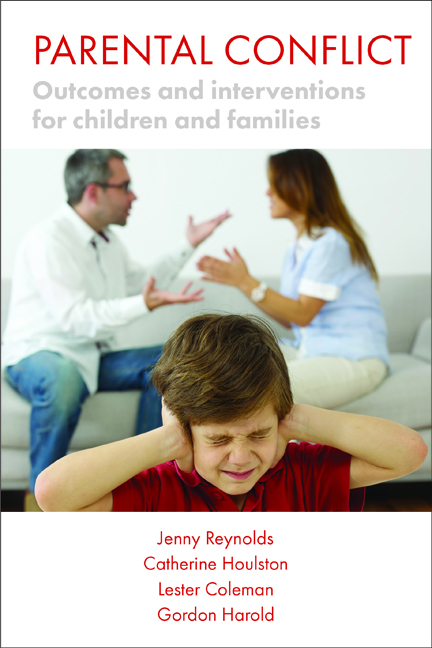Book contents
- Frontmatter
- Contents
- Foreword
- Preface
- 1 Conflict in context
- 2 Understanding different types of conflict
- 3 The impact of inter-parental conflict on children
- 4 How does inter-parental conflict affect children?
- 5 Risk and resilience: why are some children affected more than others?
- 6 Review of conflict-based interventions for couples
- 7 Implications for practice: How to help families
- 8 Conclusions and recommendations
- References
- Index
2 - Understanding different types of conflict
Published online by Cambridge University Press: 04 February 2022
- Frontmatter
- Contents
- Foreword
- Preface
- 1 Conflict in context
- 2 Understanding different types of conflict
- 3 The impact of inter-parental conflict on children
- 4 How does inter-parental conflict affect children?
- 5 Risk and resilience: why are some children affected more than others?
- 6 Review of conflict-based interventions for couples
- 7 Implications for practice: How to help families
- 8 Conclusions and recommendations
- References
- Index
Summary
For many children conflict between parents is a natural and normal part of family life and does not signify the demise of the parents’ relationship or any serious threat to wellbeing. For other children, however, conflict between parents is a serious source of stress with debilitating implications for their emotional and behavioural development (Harold and Leve, 2012). What constitutes differences in children's adaptation to inter-parental conflict?
How this conflict is handled is of primary importance when explaining child outcomes. Important aspects are the intensity of the conflict, the negativity expressed, or emotional tone, the behaviours parents adopt towards one another, the topic of conflict, and if and how things are resolved. Indeed, Lavner and Bradbury (2012) note the importance of negative communication having the capacity to erode relationships and lead to divorce, even among ‘satisfied newly-weds’. This recent study emphasises the point that conflict and negative communication is a matter of great influence on the stability and quality of couple relationships, and one worthy of investment through intervention programmes, such as those reviewed in Chapter 6. The paper concludes:
‘Thus it may only be several years into marriage – when additional stress emerges, or when fundamental disagreements about life values boil over – that negative communication exerts its impact…the present findings reaffirm the value of targeting negative communication in preventive interventions.’ (from Lavner and Bradbury, 2012, p 8).
What type of conflict matters?
One important aspect of conflict is how often parents argue. Rather than getting used to conflict, children become more sensitive or reactive to it as they experience more of it (Erath and Bierman, 2006). In addition to the detrimental effects of frequent conflict, the content of conflict is also important in explaining effects on children. How parents argue, what they argue about, whether or not conflicts are about the child, and the extent to which conflict is resolved all influence whether or not children are adversely affected by conflict. Earlier work on children and inter-parental conflict distinguished between destructive, constructive and productive conflict suggesting that conflict could be productive when children learn from observing parents handle disagreements well. More recently, researchers have focused on the distinction between constructive and destructive conflict, rather than productive conflict (Goeke- Morey et al., 2003).
- Type
- Chapter
- Information
- Parental ConflictOutcomes and Interventions for Children and Families, pp. 13 - 22Publisher: Bristol University PressPrint publication year: 2014



